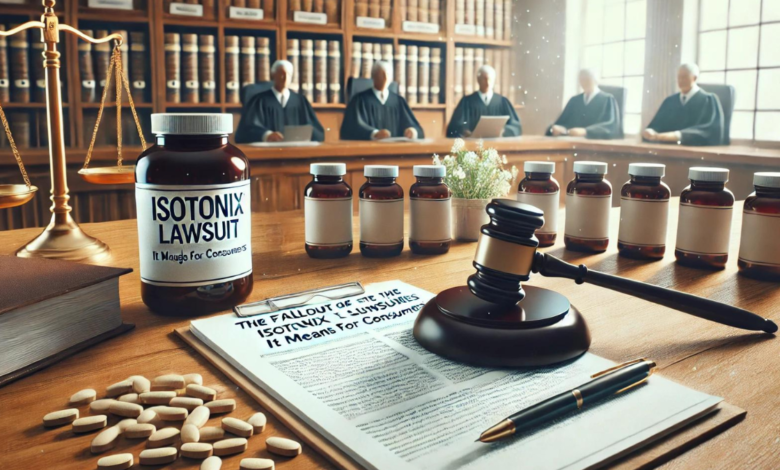The Fallout of the Isotonix Lawsuit: What It Means for Consumers

Introduction
The dietary supplement industry often finds itself at the heart of significant isotonix lawsuit, and the recent Isotonix lawsuit is a prime example. Isotonix, known for its range of supplements that promise enhanced absorption due to its isotonic state, has faced legal challenges that have impacted the company and resonated with consumers and the broader health products market. This article delves into the details of the lawsuit, its implications for consumers, and the wider lessons it teaches about regulatory oversight and consumer safety.
Background of the Isotonix Lawsuit
Isotonix products are marketed as containing a blend of vitamins, minerals, and organic compounds that, when mixed with water, create an isotonic solution purportedly absorbed more efficiently by the body. The lawsuit emerged when allegations surfaced that some of the health benefits claimed by Isotonix could not be substantiated by scientific evidence. Furthermore, issues were raised about the marketing practices being potentially misleading, promising more than the products could reliably deliver.
Legal Aspects of the Case
The legal proceedings focused on several key issues:
- Misrepresentation: The lawsuit’s core claim was that Isotonix misrepresented the efficacy of its products, violating trade and consumer protection laws.
- Consumer Deception: Accusations that marketing strategies were designed to deceive consumers about the potential health benefits.
- Regulatory Compliance: Examination of whether Isotonix complied with FDA regulations regarding supplement labelling and marketing.
The outcome of these legal confrontations has led to significant consequences for the company, including settlements and mandates to alter its marketing approaches.
Implications for Consumers
- Increased Awareness: Consumers are becoming more vigilant about their supplements, questioning claims and seeking more robust evidence of efficacy and safety.
- Regulatory Scrutiny: The lawsuit has prompted tighter scrutiny from regulatory bodies, ensuring that supplement manufacturers adhere to strict marketing and product transparency guidelines.
- Market Dynamics: The legal issues surrounding Isotonix have led to a shift in market dynamics within the supplement industry, with companies increasingly prioritizing transparency and scientific validation in their product lines.
Consumer Rights and Protection
One significant outcome of the Isotonix lawsuit is the heightened discussion of consumer rights and protections. This section explores how consumers can protect themselves from misleading claims and what legal recourse is available in the face of deceptive practices.
Lessons Learned and Best Practices
The Isotonix lawsuit serves as a reminder of the critical need for consumers to remain informed and cautious. Best practices emerging from this case include:
- Educating Yourself: Consumers should educate themselves about supplements’ ingredients and purported benefits.
- Seeking Professional Advice: Consult healthcare providers about supplements, especially those claiming extraordinary benefits.
- Verifying Claims: Checking for scientific backing and regulatory compliance of supplement claims.
Conclusion
The fallout from the Isotonix lawsuit offers a cautionary tale about the dietary supplement industry’s complexities. It underscores the need for consumer vigilance and regulatory oversight to ensure that supplements’ benefits do not come at the cost of consumer trust and safety.
FAQs about the Isotonix Lawsuit
- What was the Isotonix lawsuit about?
- The Isotonix lawsuit centred around allegations that the company made unsubstantiated claims about the health benefits of its products, which were deemed misleading to consumers.
- How did the lawsuit affect Isotonix consumers?
- The lawsuit raised awareness among consumers about the importance of scrutinizing health claims made by supplement brands and encouraged more informed decision-making regarding health products.
- What were the legal consequences faced by Isotonix?
- While specific details might vary, typical implications in such cases can include financial settlements, changes in marketing practices, and sometimes ongoing monitoring by regulatory bodies.
- How can consumers protect themselves from misleading health product claims?
- Consumers can protect themselves by researching products, consulting healthcare professionals before using new supplements, and verifying claims through credible sources.
- What broader impact did the lawsuit have on the dietary supplement industry?
- The lawsuit likely prompted a reevaluation of marketing practices across the sector, potentially leading to more stringent regulatory requirements and an increased emphasis on scientific validation of product claims.
You May Also Read: https://trendbrizz.com/unmissable-essentials-every-new-parent-needs/




